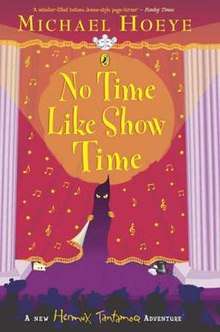No Time Like Show Time
No Time Like Show Time is a children's fantasy mystery novel by Michael Hoeye, first published in 2004. It is the third book in the Hermux Tantamoq series, which includes Time Stops for No Mouse,The Sands of Time, and Time to Smell the Roses.
 2004 first edition | |
| Author | Michael Hoeye |
|---|---|
| Country | United States |
| Language | English |
| Genre | Children's novel |
| Publisher | Speak, a division of Penguin Putnam |
Publication date | 10 July 2004 |
| Media type | Print (Hardback & Paperback) |
| Pages | 288 pp |
| ISBN | 0-670-91308-1 |
| OCLC | 60512513 |
| Preceded by | The Sands of Time |
| Followed by | Time to Smell the Roses |
Plot introduction
Hermux is back in Pinchester after his adventures in the desert, trying to return to his normal life as a watchmaker. He receives a mysterious invitation to the Varmint Variety Theater from the impresario, Fluster Varmint. Fluster is being blackmailed and needs Hermux's help to save his theatre. But show business is a whole new world of weirdness for our modest hero.
Trivia
There is a character nicknamed "Parrot of 1,000 Voices", which may be a reference to Mel Blanc.
gollark: And value that over actual money.
gollark: Which I suppose can make some sense if you assume that it's "rational" in that people... like surprises, or something, but...
gollark: People *play the lottery*, too.
gollark: People somehow can't accept positive-sum games.
gollark: > A core proposition in economics is that voluntary exchanges benefit both parties. We show that people often deny the mutually beneficial nature of exchange, instead espousing the belief that one or both parties fail to benefit from the exchange. Across 4 studies (and 7 further studies in the Supplementary Materials), participants read about simple exchanges of goods and services, judging whether each party to the transaction was better off or worse off afterwards. These studies revealed that win–win denial is pervasive, with buyers consistently seen as less likely to benefit from transactions than sellers. Several potential psychological mechanisms underlying win–win denial are considered, with the most important influences being mercantilist theories of value (confusing wealth for money) and naïve realism (failing to observe that people do not arbitrarily enter exchanges). We argue that these results have widespread implications for politics and society.
This article is issued from Wikipedia. The text is licensed under Creative Commons - Attribution - Sharealike. Additional terms may apply for the media files.